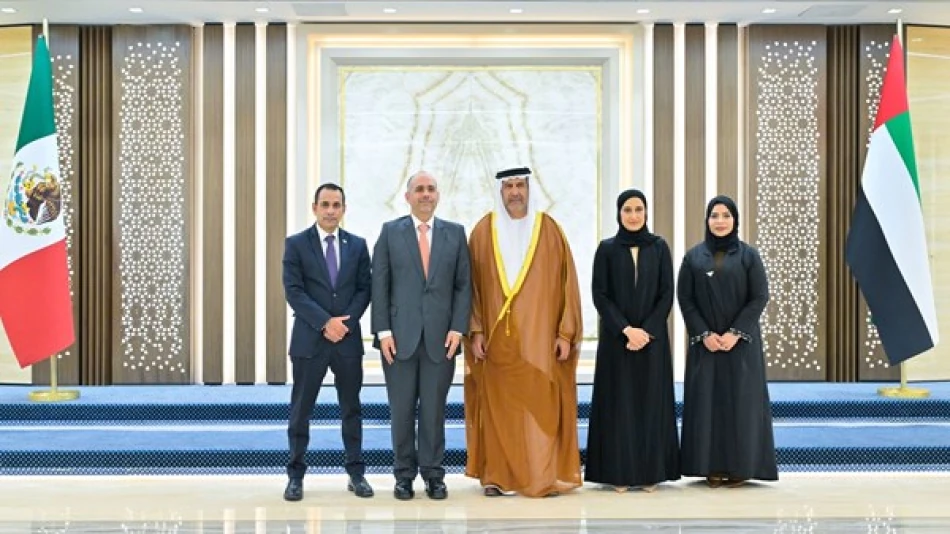
UAE Federal National Council and Mexican Congress Explore Parliamentary Cooperation
UAE and Mexico Forge Parliamentary Alliance to Counter Growing Regional Challenges
The UAE Federal National Council and Mexico's Chamber of Deputies are moving toward a formal parliamentary cooperation agreement that signals both nations' intent to leverage legislative diplomacy in an increasingly multipolar world. The proposed memorandum of understanding represents more than routine diplomatic courtesy—it reflects a strategic pivot by middle powers seeking alternative partnerships beyond traditional Western alliances.
Strategic Timing Behind the Partnership
Dr. Tariq Hamid Al Tayer, First Deputy Chairman of the UAE's Federal National Council, met with César Augusto Rendón García, head of the Mexican-Emirati Parliamentary Friendship Group, at the Council's Abu Dhabi headquarters to discuss enhanced parliamentary cooperation. The timing is significant: both countries are navigating complex geopolitical landscapes where regional influence increasingly matters.
Al Tayer emphasized the importance of formalizing this cooperation through a parliamentary memorandum of understanding aimed at exchanging legislative expertise and activating parliamentary diplomacy. This approach mirrors successful models seen in Singapore's parliamentary engagement strategy and reflects the UAE's broader diplomatic diversification following its Abraham Accords success.
Beyond Symbolic Gestures: Economic Imperatives
The parliamentary cooperation builds on accelerating bilateral relations between the UAE and Mexico, particularly following recent bilateral partnership agreements. For investors and trade watchers, this legislative alignment suggests deeper economic integration ahead—potentially in energy transition technologies, where both countries are major players.
Mexico's growing importance in nearshoring strategies, combined with the UAE's position as a Middle Eastern financial hub, creates compelling synergies. The parliamentary framework could facilitate smoother regulatory coordination for cross-border investments, particularly in renewable energy and logistics sectors.
Multilateral Leverage Strategy
García expressed Mexico's commitment to advancing parliamentary cooperation, emphasizing benefits for both nations' peoples and supporting their strategic partnership trajectory. The focus on International Parliamentary Union activities reveals a calculated approach to building coalitions within global governance structures.
This mirrors strategies employed by countries like Turkey and Indonesia, which have used parliamentary diplomacy to punch above their weight in international affairs. For the UAE, strengthening ties with Latin America's second-largest economy provides additional leverage in global forums where regional blocs increasingly matter.
Market Implications and Investment Outlook
The parliamentary cooperation framework could signal upcoming trade facilitation measures and investment protection agreements. Both countries have demonstrated pragmatic approaches to economic policy—Mexico through its energy sector reforms and the UAE through its economic diversification initiatives.
For multinational corporations, this legislative alignment suggests more predictable regulatory environments for cross-border operations. The emphasis on "mutual respect and friendship" in their cooperation framework indicates both countries prioritize stable, long-term business relationships over short-term political considerations.
As traditional Western partnerships face strain from domestic political pressures, the UAE-Mexico parliamentary alliance represents a broader trend toward South-South cooperation that could reshape global trade patterns in the coming decade.
Most Viewed News

 Layla Al Mansoori
Layla Al Mansoori






